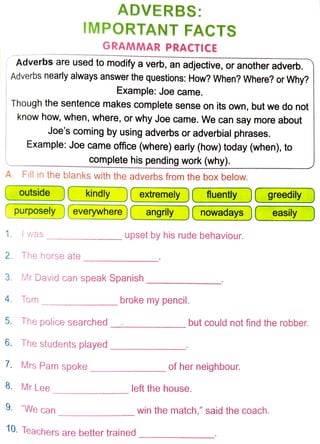
Adverbs Ex (1).pdf
- 1. -- ADVERBS: IMPORTANT FACTS GRAMMAR PRACTICE 1 ( Adverbs are used to modify a verb, an adjective, or another adverb. Adverbs nearly always answer the questions: How? When? Where? or Why? Example: Joe came. Though the sentence makes complete sense on its own, but we do not know how, when, where, or why Joe came. We can say more about Joe's coming by using adverbs or adverbial phrases. Example: Joe came office (where) early (how) today (when), to complete his pending work (why). A. Fill in the blanks with the adverbs from the box below. ( outside ) ( kindly ) ( extremely ) ( fluently ) ( ( purposely ) ( everywhere ) ( angrily ) ( nowadays ) ( 1. I was upset by his rude behaviour. - - -- - - 2. The horse ate - - -- - - 3. Mr David can speak Spanish ______ 4. Tom broke my pencil. greedily ) easily ) 5. The police searched but could not find the robber. 6. The students played 7. Mrs Pam spoke of her neighbour. - - -- - - 8. Mr Lee left the house. 9. "We can win the match," said the coach. - - - -- - 10. Teachers are better trained - - - - --
- 2. GRAMMAR PRACTICE Simple adverbs can be classified as adverbs of time, place, manne r r, degree, mood, and frequency. l These adverbs answer the question 'When', 'How long' 'Where', 'How' 'To what extent', 'How often'. ' B. Underline the adverbs in the following sentences and write its type in the blank. 1. He goes to school daily. _______ 2. Tony got up early in the morning. _______ 3. Sherry went upstairs. - - - - - - - 4. Listen to me carefully. __________ 5. He is almost on the verge of death. - - - - - - - 6. No, he never came to see me. - - - - - - - 7. Danny lives somewhere in New York. -------- 8. Barking dogs seldom bite. _______ 9. They came to my birthday party yesterday. - - - - - - - 1O. The plane flew high in the sky. ------- 11 . Kate often goes to the park. ------- 12. Hop quickly collected the shells from the beach. ------~
- 3. c. Fill in each blank with the correct form of interrogative adverb from the brackets. 1. (//ho/What) ________ borrowed my car? 2. tWhat/How) _______ . did you get here? 3. (Who/Why) ________ completed the project? is my bag? - - - - ---- 4. (Where,What) 5. (//here/When) 6. VVhoNVhy) 7. (Nhen/How) 8. (VVhat/How) 9. (What/When) ________ is your mind wandering? ________ have you come late? ______ __ far have you to go still? _ _______ did you solve this sum? _ _______ will you travel to America? _ _______ movie would you like to watch? _______ would you like to go for vacations? ________ is that girl in the black coat? 10. (What/Which) 11 . (Where/Which) 12. (VVho/What)
- 4. • --A dverbs have comparative and superlative forms as well. They are often used to make the meaning of a verb or other adverb stronger or weaker. This is known as 'degrees of comparison'. There are three degrees of comparison: Positive, Comparative, Superlative. The positive degree is the simple form of adverb. The comparative degree is used to compare two actions. The superlative degree is used to compare three or more. Positive Comparative Superlative Slow Slowly Slowest Wisely More wisely Most wisely Well Better Best E. Complete each sentence with the correct form of the adverb that is in brackets. 1. Janet sang ______ than Annie did. (sweetly) 2. He performed _ _____ of all the artists. (well) 3. This Science test was than the last one. (hard) ------ 4. I did my work ______ than my brother. (fast) 5. She danced _____ of all. (gracefully) 6. My brother travelled ______ than my uncle for the business. 7. Tim played football _____ than Kate. (badly) 8. Sam ran ______ than John. (fast) . 9. Jenny shouted ______ than Lisa. (loudly) 10. Tammy arrived school ______ than her friends. (late}